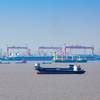The U.S. Coast Guard successfully completed its first week enforcing new international and domestic maritime security requirements of the International Ship and Port Facility Security Code and the Maritime Transportation Security Act.
“The men and women of the Coast Guard have been very busy enforcing these security requirements since the deadline, but our efforts to ensure compliance were successful because we began this task well before July 1,” said Adm. Thomas H. Collins, commandant of the Coast Guard. “We’ve been working closely with the maritime industry and foreign governments for some time to ensure that we successfully balanced the needs of trade with our homeland security concerns, and the relatively small number of non-compliant ships and facilities that we’ve encountered is a testament to our collaborative success.”
From July 1 through July 6 (the most current data which is available), foreign vessels made approximately 1,600 port calls on U.S. ports. On average, over 260 vessels called each day. The Coast Guard conducted a total of 442 security examinations, 428 of which were conducted dockside, 14 were conducted at sea. Approximately 1,400 vessels were boarded through a voluntary pre-inspection program in place before July 1, which allowed the Coast Guard to reduce the number of vessels that needed to be boarded in the first week, alleviating the burdens on its boarding teams and allowing commerce to flow freely through U.S. ports.
Of the foreign vessels scheduled to call on U.S. ports, nine were denied entry, 10 were expelled from port, and 30 were detained in port or forced to restrict their operations for failing to comply with the new security requirements. Some of these vessels have subsequently taken action to come into compliance. Currently, 12 vessels still have denial-of-entry or expulsion-from-port orders outstanding and 17 vessels still have detentions or restrictions in place.
The largest categories of foreign vessels found not in compliance were either vessels of less than 500 gross tons not subject to the International Convention for Safety Of Life At Sea, or bulk carriers. These types of vessels generally have a history of lower compliance with international standards for safety and environmental protection.
Panamanian-flagged vessels represented approximately 25 percent of the vessels found not in compliance. Panamanian-flagged vessels also typically make up 25 to 27 percent of the foreign vessels that call on the United States.
Domestically, as of yesterday 33 U.S. vessels and 18 U.S. port facilities are restricted or suspended from conducting certain operations for failing to comply with the security act. Of the U.S. vessels restricted, 25 are towing vessels, five are offshore supply vessels, two are passenger vessels, and one is a mobile drilling unit. Of the U.S. facilities restricted, 13 are bulk or cargo facilities and five are passenger terminals or marinas.
The majority of the actions taken against U.S. vessels and facilities and foreign vessels were on July 1, when actions were taken against 31 foreign vessels, 40 U.S. vessels and 19 U.S. port facilities. On July 6, actions were taken against two foreign vessels, while there were no actions taken against U.S. vessels or U.S. facilities.
Sponsored Content
Chris-Marine’s solutions help to prolong engine lifetime

Subscribe for
Maritime Reporter E-News
Maritime Reporter E-News is the maritime industry's largest circulation and most authoritative ENews Service, delivered to your Email five times per week










